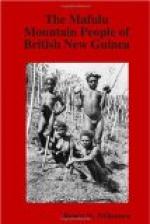The rain sorcerer is apparently merely a diviner. Dr. Seligmann would perhaps include him among the departmental experts, but the Fathers of the Mission regard him as being a true sorcerer. He is the man to whom the people go in anticipation of a proposed important event, such as a big feast, or perhaps a fighting or large hunting expedition, to ascertain and inform them whether the period in which it is proposed that the event shall occur will be fine or wet; but he does not profess to be able to do more than this, and they never expect him to prevent or bring about the rain, or in any way hold him responsible for the weather as it may in fact eventually occur.
The sorcery connected with illness and death is not so simple; and there is no doubt that it is not confined to powers of divination, but includes powers of actual causation. This department of sorcery obviously includes the ceremonial in connection with the supposed dying chief. But it is not confined to this ceremony, as it is generally believed by the Mafulu people that sickness, which does not necessarily end in death, and death itself, can be, and commonly is, brought about by the operation of sorcerers in one way or another through the medium of certain things. The only things of this nature concerning which I was able to obtain information are (1) the inedible part of some vegetable food which the victim has recently eaten (e.g., the outside part of a sweet potato or banana or the cane part of a sugar cane), and (2) the victim’s discharged excrement or urine. I found no trace of any use for purposes of sorcery of the edible remnants of the victim’s food, nor (except as regards a woman’s placenta, to which I shall refer presently) of any part of his body, such as his hair or nails; and, in fact, the free way in which the natives throw away their hair when cut is inconsistent with any belief as to its possible use against them.
First, the inedible remnants of recently consumed vegetable food. The use of this as a medium for causing illness and death is apparently confined to the case of a victim who has passed the stage of very young childhood. Why this is so I could not learn; though in point of fact a mere infant would hardly be eating such things as a regular practice. A man or woman, however, never carelessly throws aside his own food remnants of this character; and his reason for this is fear of sorcery. He carefully keeps them under his control until he can take them to a river, into which he throws them, after which they are harmless as a medium against him. The fear concerning these remains is that a sorcerer will use them for a ceremony somewhat similar to that described in connection with the death of a chief, but in a hostile way. No such precautions are taken with reference to similar food eaten by very young children.




